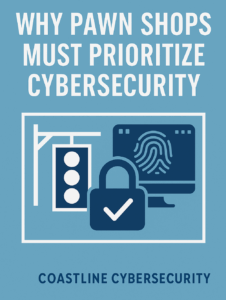
7 Essential GLBA Compliance Requirements for Pawn Shops in 2025
GLBA compliance for pawn shops is now mandatory under federal regulations. As a pawn shop owner handling sensitive customer financial information daily, you must understand your obligations under the Gramm-Leach-Bliley Act (GLBA) and the FTC Safeguards Rule to protect your business and customers.
Key GLBA Compliance Requirements for Pawn Shops
1. Conduct a Written Risk Assessment for GLBA Compliance
A comprehensive risk assessment forms the foundation of your information security program. This assessment identifies potential threats to customer information, evaluates current safeguards, and determines the likelihood and impact of various security incidents. Your GLBA risk assessment should:
- Document all locations where customer information is stored
- Identify potential internal and external threats
- Evaluate the effectiveness of existing controls
- Estimate the potential damage from identified risks
- Establish priorities for addressing vulnerabilities
2. Develop an Information Security Program
Based on your risk assessment, you must develop and implement a written information security program tailored to your pawn shop’s size, complexity, and the sensitivity of customer information you handle. Your program should include:
- Administrative, technical, and physical safeguards
- Clear procedures for protecting customer information
- Measures to securely dispose of customer information when no longer needed
- Controls for service providers with access to customer data
- Procedures to monitor and adjust the program as needed
3. Implement Regular Testing and Monitoring for GLBA Compliance
Ongoing testing ensures your security measures remain effective against evolving threats.
Annual Penetration Testing
Penetration testing simulates real-world attacks to identify vulnerabilities in your systems before malicious actors can exploit them. These tests must be conducted at least annually and should:
- Test the effectiveness of access controls
- Attempt to breach security perimeters
- Identify potential paths to sensitive customer information
- Provide actionable recommendations for remediation
Biannual Vulnerability Assessments
At least twice yearly, you must conduct vulnerability assessments to identify security flaws in your systems. These assessments should:
- Scan networks for known vulnerabilities
- Review system configurations
- Check for missing security patches
- Identify weaknesses in authentication mechanisms
- Evaluate potential vulnerabilities in customer-facing applications
4. Designate a Qualified Individual
You must appoint a single qualified individual responsible for overseeing and implementing your information security program. This person should:
- Have appropriate knowledge and experience in information security
- Regularly report to your board or equivalent governing body
- Coordinate security activities across your business
- Stay informed about emerging threats and changing compliance requirements
- Ensure the program adapts to changing business conditions
5. Develop an Incident Response Plan for GLBA Compliance
A written incident response plan documents how your pawn shop will respond to security events. Your plan should include:
- Clear roles and responsibilities during an incident
- Steps to contain and control security breaches
- Procedures for assessing the nature and scope of an incident
- Communication protocols for notifying affected parties
- Documentation requirements for security events
- Evaluation procedures to improve response to future incidents
6. Provide Employee Training on GLBA Requirements
Your employees are both your first line of defense and a potential security vulnerability. Regular security awareness training should:
- Educate staff about security policies and procedures
- Help employees recognize and respond to security threats
- Cover proper handling of customer information
- Address safe online practices and password management
- Include procedures for reporting suspicious activities
7. Understand Exemptions for Small Pawn Shops
The FTC recognizes that smaller pawn shops may face challenges implementing all GLBA compliance requirements. Your business may qualify for certain exemptions if:
- You collect information on fewer than 5,000 consumers
- You’ve maintained a clean record free of security breaches
- You can demonstrate alternative approaches that achieve equivalent protection
How Expert Partners Help with GLBA Compliance for Pawn Shops
Meeting GLBA and FTC Safeguards requirements doesn’t have to be overwhelming. Specialized cybersecurity partners can help pawn shops navigate compliance requirements with services tailored to your specific needs:
Comprehensive GLBA Risk Assessments
Cybersecurity experts conduct thorough evaluations of your information systems, policies, and procedures to identify vulnerabilities and develop targeted remediation strategies aligned with regulatory requirements.
Penetration Testing for GLBA Compliance
Certified security professionals use the same techniques as malicious hackers to identify weaknesses in your systems before they can be exploited, helping you stay ahead of threats while meeting compliance obligations.
Vulnerability Assessments
Regular vulnerability scans and assessments help identify security gaps across your network infrastructure, applications, and systems, providing actionable insights to enhance your security posture.
Employee Training Programs for GLBA Compliance
Customized security awareness training programs designed specifically for pawn shop environments ensure your team understands their role in protecting customer information.
Incident Response Planning
Experts help you develop and test comprehensive incident response plans that minimize damage from security events and ensure your business can recover quickly while meeting regulatory notification requirements.
Conclusion: Why GLBA Compliance Matters for Your Pawn Shop
GLBA compliance isn’t just about avoiding penalties—it’s about protecting your customers and your business reputation. With the right partner, compliance becomes an opportunity to strengthen your security posture and build customer trust.
According to the Federal Trade Commission, financial institutions like pawn shops that fail to comply with the Safeguards Rule may face significant penalties. Learn more about specific requirements on the CFPB’s website.
For additional insights on cybersecurity best practices for small businesses, check out the Small Business Administration’s cybersecurity resources.
Need help with your GLBA compliance implementation? Our team of certified security professionals can guide you through the process with our proven methodology.
For more information on how we can assist your pawn shop in achieving GLBA compliance and enhancing cybersecurity, contact us today.

